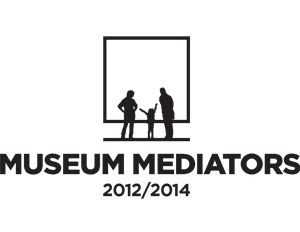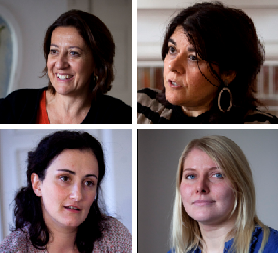Course Calendar
|
Making Museums Matter Cristina Da Milano | Elisabetta Falchetti |
|
Museum Learning Carla Padró | Irene Amengual |
|
Museum Mediation Simona Bodo | Inês Câmara |
|
Museum Marketing and Communication Ida Brændholt | Maria Vlachou |
|
Research Tools Valeria Pica | Alice Semedo |
|
Meetings, visits and presentations At a Museum |
Synopses
SESSION: MAKING MUSEUMS MATTER
Theme: The Social Value of Culture
Lecturer: Cristina da Milano
During this session, the social relevance of the Museum will be discussing, focusing on what social inclusion means and the potential of cultural institutions.
Although it is certainly material culture that provides a starting point for the process of learning in museums, it is the creation of social relationships and shared meanings that defines it. Therefore, it is vital for museums staff to step outside the walls of the museum, to experience society as it is.
—————————————————
Theme: Evolving museums in a fast chaging world. New trends, opportunities, responsabilities and agendas.
Lecturer: Elisabetta Falchetti
Museums have always evolved and are evolving today, anticipating or following socio-cultural transformations. Museum changes involve management, goals, languages, communication styles and tools, cultural trends and activities, relationship with publics and territories. What museums and what changes are desirable for our times? Nowadays our world is concerned in multiple crisis (individual, social, environmental) that require immediate responses. As museum mediators, our commitment is to monitor societies and to construct models of museum education and communication able to save the past and traditions, to answer present social requirements and to promote a better future.
Are museums ready to face these challenges and to deal with the emergency? Societies change museums; can museums change societies? What kind of museums we desire … for what kind of societies? Can museums suggest and promote better societies?
SESSION: MUSEUM LEARNING
Lecturers: Carla Padró and Irene Amengual
This session will take different theories of teaching and learning that are widely used within museum mediation, in order to analyze the following: the relational role of mediator and visitor; the epistemological notions behind the theory: worldview according to knowledge and the notion of both the educator and the visitor; the main ideas or concepts that are used in the theories; the practicality or which sort of programs, materials or resources can be produced; the methodology used and its connection with research; the effects of these programs and resources; what is left behind; the critical aspects of the theory from other perspectives.
For that matter, it will take into account the following theories or methodologies: expressionism in Art Education; constructivism; critical Constructivism; critical Pedagogy; feminist Pedagogies and Post structuralism; Visual Thinking Curriculum.
Some case studies will be presented as a basis for showing different theories of learning and their effects in visitors, the museum and the educator. A conversational and experience-based method is going to be privileged, in order to make connections with each mediator’s own praxis.
SESSION: MUSEUM MEDIATION
Theme: Intercultural dialogue in Museums
Lecturer: Simona Bodo
The session will explore the prevailing approaches to heritage and museum mediation in multicultural contexts, along with experimental strands of practice which are questioning the very notions of “heritage”, “intercultural dialogue”, “participation”. Drawing on her long-standing experience as researcher on these issues, as well as on her direct involvement in ground-breaking projects of heritage mediation in an intercultural perspective, the lecturer will guide participants through the analysis of case studies in Italian museums with a view to discussing their strengths and weaknesses, and initiating new insights on intercultural work in museums.
—————————————————
Lecturer: Inês Câmara
This session will be dedicated to the Museum Experience as a whole. We will discuss the concepts and dimensions of Education, Communication and Experience, leading to the definition of Museum Mediation.
After that discussion we will analyse how we can develop a strategy or a plan, talking about one-time activities, long-term projects and the importance of experimenting, evaluation and documentation.
SESSION: MUSEUM MARKETING AND COMMUNICATION
Theme: LEARNING MUSEUMS AND ACTIVE CITIZENSHIP. The Educational role of Museums in society
Lecturer: Ida Brændholt
How can museums undertake the democratic challenge of being relevant for citizens in the 21st Century knowledge society? Concerning this matter, the Danish Agency for Culture has developed a dynamic framework for transformation of museums, based on developing the educational role of museums in society.
Cultural competences in a Life Long Learning perspective is a basic need in the 21st Century globalized and culturally diverse knowledge society. Museums find themselves with new challenges and opportunities – to stimulate learning and personal development, and to explore issues of identity and the value of culture itself. Museums have special potentials for self-directed, free-choice learning, respecting diversity, and multiple viewpoints to take fully advantage of culture within a democratic society.
—————————————————
Theme: Museum Communications
Lecturer: Maria Vlachou
What does it really mean “a museum open to all” or “museums are for people”? What are the real implications of these statements for museums that wish to fulfil these expectations? In this session we shall explore the communications and marketing tools that can be used in order to establish well-thought, efficient and realistic strategies, adapted to each institution´s needs, which allow them to offer
SESSION: RESEARCH TOOLS
Theme: The making of meaning: what artworks tell and how their message can be translated
Lecturer: Valeria Pica
This session is focused on case studies depicting tools that museums can exploit to improve their activities and increase the interaction with all types of audience. Some topics are related to research methods, assessment tools, and best practises in museums mediation together with informal education, museums experience, and professional skills. The session also aims to share knowledge and information fostering the exchange of ideas between participants and creating a platform for ain-depth dialogue.
————————————————–
Lecturer: Alice Semedo
Reflection as a tool for development and support of practice has been increasingly recognized by different professional areas (e.g. education, health, arts) as being strategic to create depth of knowledge and meaning for all involved in the process. Alongside the use of reflection is the predominant use of action research, which some see as a way of approaching the study of human beings from a philosophical perspective, in which the sharing occurs within environments of mutual support. As a result, many scholars and practitioners suggest that one cannot improve the methodology of action research, without considering their own philosophical reflection. Reflective practice may, however, become mechanistic in use, unless new creative approaches employed. Generally, creative research methods are those that employ a creative activity or shared experience with the goal that the participants are brought to new areas, as they are not only free to enjoy the process of research, but also to respond more fluidly to the very issues proposed by the research. Exploring the tension between the use of evidence-based practice and reflection, this workshop explores the use of subjective approaches and perceptions of personal, possibly more creative and visual approaches, as forms of critical reflection and participation in the construction of a new collaborative / creative paradigm to think about mediation in museological context.
For more information, regarding this course, please contact the project partner closer to you.


